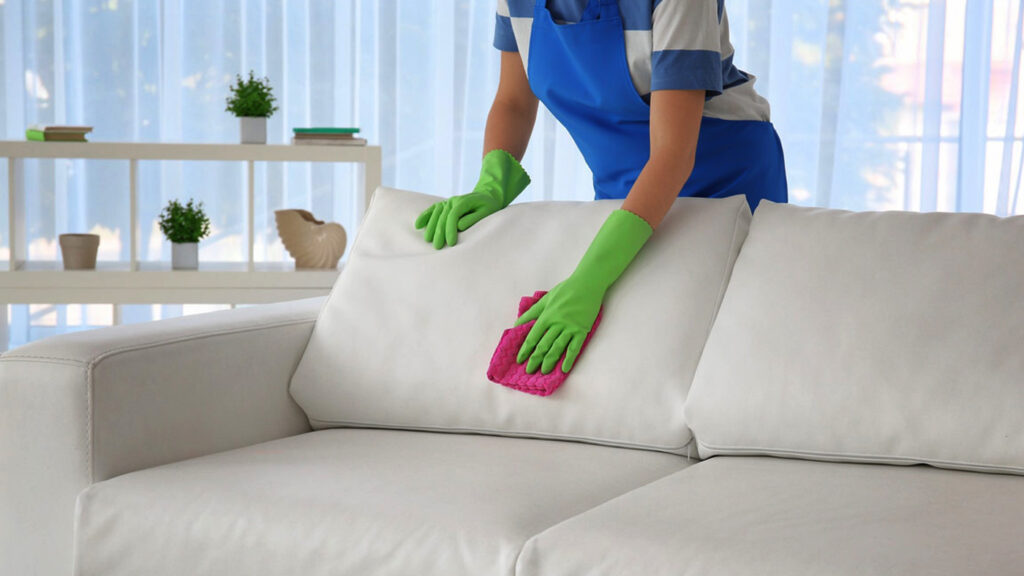
Aside from your bed, your couches are most certainly one of the most used pieces of furniture in your house. With most family gatherings taking place on living room seating, it’s one of the simplest locations in your home to accumulate dirt and stains, whether from a dropped glass of wine, youngsters playing on the furniture, or the paws of your four-legged pals. Not to mention that upholstery, such as couches, can trap undesirable odors if not cleaned regularly. The problem with this simple cleaning task is that sofa covers tend to shrink in the washer. This isn’t ideal because you’ll need to replace the pristine covers after you’re done. However, if they no longer fit, you’ll have a huge problem. Some would describe it as a disaster!
Here’s everything you need to know about cleaning your sofa!
Understanding sofa fabrics:
Sofa covers can be made of a variety of materials, and not all of them are at risk of shrinking. The most common sofa cover materials include:
Cotton:
Cotton is a natural fabric that is both breathable and comfy. Pure cotton sofa covers shrink easily if not properly laundered, especially when exposed to heat and agitation. Thus, you should wash them at low temperatures and avoid final spinning.
Polyester:
Polyester is a synthetic fabric recognized for its durability and wrinkle resistance. Polyester sofa covers shrink less when washed since the fabric is resistant to heat and strain. However, severe heat or incorrect care might still result in shrinkage.
Velvet:
A sumptuous and velvety fabric with a pile structure, velvet is usually made of silk, cotton, or synthetic fibers. Velvet sofa covers, particularly those made of natural fibers such as silk or cotton, might shrink if not washed carefully. Dry cleaning is frequently recommended for velvet covers to reduce shrinkage.
Microfiber:
This synthetic fabric is composed of fine polyester or nylon fibers. It is renowned for its durability and stain resistance. Microfiber sofa covers have a low danger of shrinking while washing because the fabric is engineered to endure regular cleaning. However, to retain their quality, follow the manufacturer’s washing guidelines.
Leather:
Leather sofa coverings demand specific maintenance and should not be washed like fabric covers. This material does not shrink when washed, however, it may be harmed if exposed to water or severe cleaning products. Instead, leather covers should be cleaned and conditioned with specialized leather cleaning chemicals.

How often should you clean your sofa covers?
The frequency with which you clean your couch cushions is determined by how much the couch is used and how frequently stains occur. Typically, you should wash couch cushion covers every month or so, but you may need to increase your cleaning frequency if you have high-traffic living rooms.
Tips on washing sofa cover:
Sofa coverings will become soiled, and there is little you can do to prevent this. Drinks will undoubtedly spill, crayons will color them, and paws will track dirt across your sofa covers. So, it’s critical to keep the covers looking clean and fresh. This is readily accomplished by washing and maintaining them regularly. Here are some of the tips to keep them clean.
Manufacturer’s label:
Before cleaning your sofa cover, always read the instructions carefully. There’s typically a tag somewhere, and you must read it. Failure to do so could have serious consequences for you and your sofa!
Hoover your covers:
You’ll need to hoover your sofa coverings before washing them. Hoovering them will remove any loose debris and animal hair that has become lodged in the covers. This will avoid subsequent clogs, such as in the washing machine.
Spot stains:
Spot clean stains as they appear to aid in the overall cleaning procedure. Don’t wait to wipe down your sofa covers; clean them right away. This may keep your sofa coverings from becoming soiled in tenacious dirt that is difficult to clean later.
Clean by hand:
Unless your sofa has a zipper, you cannot remove the covers to clean them. Do not rip your sofa covers off; this will destroy the entire sofa. Leather sofas, for example, cannot be machine-washed. If you are unable to remove your covers, spot-clean them by hand. Always follow the cleaning instructions listed on the labeling.
Professional help:
If you are work-bound and unable to do any of the above-mentioned at home, one easy solution is to get your sofa cushions cleaned by professional cleaners. They know exactly how to take care of your sofa cushions. With professional help at your side, you need not worry about what ingredients to use while washing sofa cushions, whether to bleach the cushions or not, and many little things like these.
Final Words
Washing your sofa covers can be a great method to keep your couch looking good, but you should exercise caution. Keep in mind that washing the covers may cause some fading, so test a tiny, inconspicuous area before cleaning.
You will be happy with the results after learning how to clean stains and wash your cushion covers, whether by hand, machine or through professional cleaners. With your cushions looking fresh and clean, you can fully enjoy your living room.




